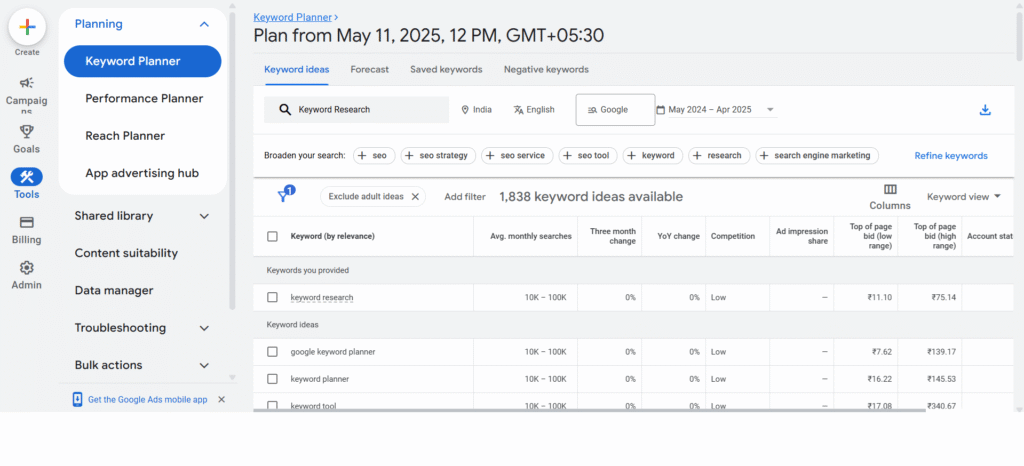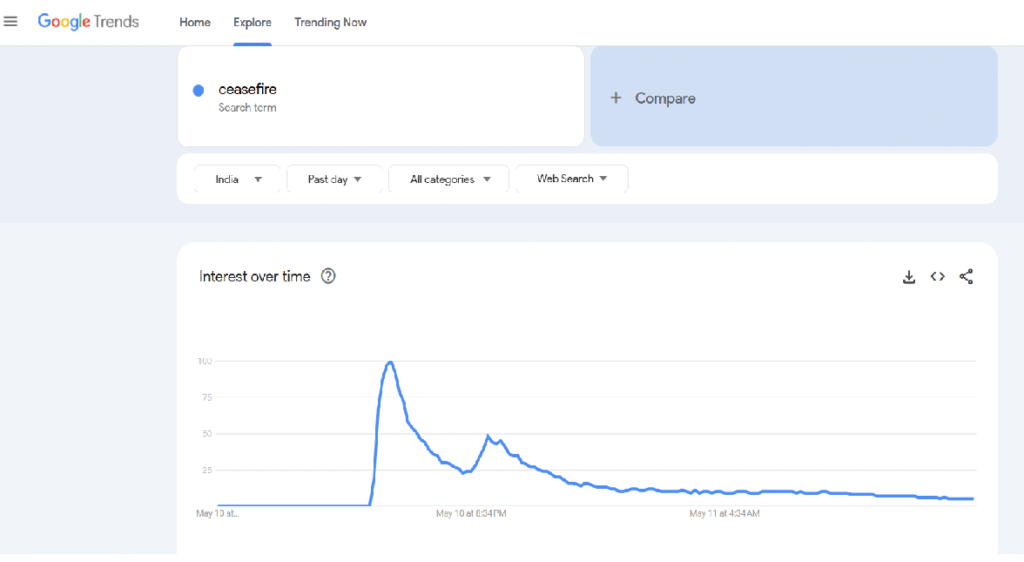A keyword, also called SEO Keyword, is a word or phrase that people type into a search engine such as Google to find a product, service or information.
In SEO, we use keywords to optimize the content of our website, so that when users search those keywords on Google, they can find our website.
In this post, you will learn the complete process of Keyword Research for SEO in 2025.
Table of Contents
Keywords are ideas that define what your website content is about. Proper placement of keywords on our website helps to improve its ranking.
Suppose you have a website that sells Dell laptops, a user searches “Buy Dell Laptop” on Google and finds your website on the first page of Google, then there is a high possibility that he may visit your website and purchase laptop from your website.
In above example “Buy Dell Laptop” is a keyword. This is one example of keywords; user may use different combinations of words to search for your products.
We need to identify all these keywords and target them by creating relevant content. This process of finding keywords is called Keyword Research.
What are types of SEO Keywords?
Keywords are the crucial component of SEO because they tell search engines how relevant your content is to the user’s search query.
There are several types of keywords, we will discuss some of them based on their characteristics and usage.
Short-tail Keywords:
As the name suggests, short-tail keywords are short and usually consists of one or two words.
Such as – Insurance, Real Estate.
Due to their broad nature and popularity, short-tail keywords are highly competitive, making it very difficult to rank for them. Basically, these keywords are dominated by top brands and higher authority sites. Therefore, targeting long-tail keywords is a better SEO strategy.
Long-tail Keywords:
Long-tail keywords are made up of four or more words and are more specific. They are less competitive and it might be easy to rank for them, although their search volume is much lower than short-tail keywords.
Long-tail keywords are perfect for targeting a specific audience or topic.
As they are more intent specific, their conversion rate and user engagement is also higher.
Example-
- best running shoes for men
- cheap web hosting for WordPress blog
- best protein powder for muscle gain
Primary Keyword:
The primary keyword is the most important keyword of your content. It represents the main topic of your post or web page that you want to rank for. You should incorporate the primary keyword naturally throughout your content including title, headings and body text.
Suppose you are writing a blog post about email marketing tips
Primary keyword: email marketing tips,
Supporting keywords: Email marketing for beginners, how to do email marketing, how to grow email list, what are free email marketing tools.
Secondary Keyword:
Secondary keywords are supporting keywords that provide extra information about the primary keyword.
They help search engines understand the full context of your topic and relevance of content to user’s search query.
Secondary Keywords also help to improve depth and relevance of content. You can rank for multiple search queries using these keywords. They help to cover all related subtopics.
Use secondary keywords in subheadings (h2/h3), image alt tags and body text naturally.
Tips: When you’re launching a website, blog or SEO campaign, first focus on long-tail keywords, as they help to attract targeted audience and build authority more easily than short-tail ones.
LSI Keywords:
LSI (Latent Semantic Indexing) keywords are semantically related to your primary and secondary keywords. They help search engines better understand the context of your content.
Example:
For the Primary keyword: Apple iPhone
LSI Keywords: iOS, Smartphone, Apple Store, Face ID, iPhone Apps etc.
Why is keyword research important for SEO?
Keyword research is the most important aspect of search engine marketing.
- It helps you to identify those words and phrases that your target customers are using to find information related to your business.
- It helps you to identify the keywords or topics your competitors are targeting and ranking. You can improve your rankings by creating higher-quality content on those topics.
- It helps you to predict shifts in demand and respond to changing marketing conditions.
- It helps to add values to your product or service that users are actively seeking through the web.
- Keyword research helps content creators to find new ideas for their blog posts.
- It gives you insights on how difficult or easy it is to rank on a particular topic.
- When you include relevant keywords in your content, it helps the search engines to understand what your website is about and then they give more relevant results to the users.
- Without going through the keyword research process, you cannot develop a meaningful strategy or plan for updating your website to be more search friendly, or effectively create new content to attract search traffic.
Don’t rush through it. Keyword research is not a fast process, especially if you have a large retail site with a lot of different products. Therefore, spend your time on picking and choosing right keywords for your niche.
Before doing keyword research, you should be familiar with the business. You don’t have to be expert on it, but you should have a reasonable understanding of company’s products, services, history, size of the market, its competitors, impact of seasons, festivals and holidays, and basic customer demographics.
Building Topic Lists Before Keyword Research:
Before doing keyword research, its good thing to build a topics list related to your business, products and services.
Try to start from lowest level then move one step up.
For example, if the company sells smartphone cases and screen protectors, then lowest level might be smartphone accessories.
Now think about the possible related topics.
- Why do people buy smartphone accessories?
- What are their problems?
- What solutions do these products provide?
- What other options they might consider?
- What are the most important features and qualities?
As a solution provider, you think from the solution side. You focus on the final product or service you offer — the answer to a problem. But your customers begin their journey much earlier. Sometimes they even don’t know about the need or a problem.
As a business owner or marketer, you’re naturally thinking:
“Here’s our product, and here’s how it solves the customer’s problem.”
But customers don’t start there. They begin with a problem, question, or interest, and sometimes they might not even know what solution exists yet.
Imaging your company sells cases and screen protectors for Apple and Samsung phones. It is obvious that people buy a case or screen protector to avoid damage.
But what are some indirect situations that also lead the clients to your products.
Suppose a customer dropped an expensive mobile and searching for repair it. But deep down they are wondering how they can prevent this from happening again. That’s a good opportunity for you to come up with a solution in their search result.
Now take a slightly different situation — water damage.
Someone might search
- How to tell if their phone has been water damaged?
- How to properly dry out a phone that fell into a toilet?
That is also great time to show up your waterproof cases in their search result. They are not looking for waterproof cases but this can be an opportunity for you to educate them about your product and its features.
You can think of a different topic like phone insurance. Someone might explore this after suffering a phone loss, but insurance is expensive. You can come up with your products as a cheaper preventive option to a monthly insurance fee.
A query like Is smartphone insurance worth it? Could be sales-driven for you.
Finding Keywords of your competitors:
Your competitors might also have faced the challenges while doing keyword research and content optimization.
They may not have invested in SEO, but they have definitely put in a lot of effort to understand and attract their customers.
So, review your competitors’ websites and try to find out what keywords and phrases they are using to promote their products and services.
- What unique keywords are they using?
- What nonbrand keywords are they using?
- What topics have they written blog posts on?
Talk to People:
When you talk to different employees of your company, you will get different insights about your customers. You can get ideas for different keywords by talking to them.
You can ask them some questions like
- What are the words and phrases that define our business and related products or services?
- What are the words and phrases that customers use when talking about our products or services?
You might also consider these following sections of people to consult for keyword research purpose.
Start from You:
Before meeting anyone, think about your topics first and make an initial list of keywords and phrases related to your industry and its products.
Marketers:
Technically, SEO is a form of marketing, so talking to people on the marketing team may help you gain some insight. They may also have traditional marketing data that you can use for your content writing plan.
Salespeople:
Sales people talk to customers the most. So, they have a better idea of what exact language customers use when purchasing products, discussing their problems, what questions they ask before buying a product. What questions do they ask about price, warranty, return policy, reliability, and support.
Support/ Customer Service:
You can get a lot of ideas for content creation by talking to the customer support department. You can also make a list of what words or phrases customers use when talking to them about products.
Customers:
If you have access to old customers, you can ask them how they found your site. It is not necessary that everyone found your site through search engine, hence you can get valuable keywords from the person who reached you.
Non customers:
Till now whoever you talked to was someone from your company, but if an outsider searches for your product then what terms will he use?
At one time, all the customers were new to you, how did they reach you? You can get different insights by talking to them.
Top Tools to Do Keyword Research for SEO in 2025
Now we will learn to find out keywords with the help of third-party tools. Some of these will be free tools but some will be license based or paid subscription based.

Google’s Auto Complete:
When you start typing in Google’s search field, Google starts predicting the rest of the query with the help of algorithms. It shows you a list of top-ranked keywords below your query. This is the best way to find the most important keywords related to your topic.
For example, typing smart classroom might reveal suggestions like this
Google will not tell you how many times the smart classroom concept is being searched for, but since this suggestion appears at the top of the list, you can guess that it is being searched for more often than the phrases that appear below. This can give you important insight into what people are looking for, or what they are searching for related to a particular topic.

Google Keyword Planner

Google Keyword Planner is a free tool for keyword research offered by Google Ads. Using this tool, you can research keywords, get search volumes estimates, competitions, ad cost estimates.
Using these metrics, you can get insights into the popularity, and difficulty of keywords.
Google Trends
Google Trends is a free tool that helps you to find the relative popularity of a keyword over time and by geography. It also helps you to compare trend data between two or more keywords.
You can access Google Trends at Google Trends





